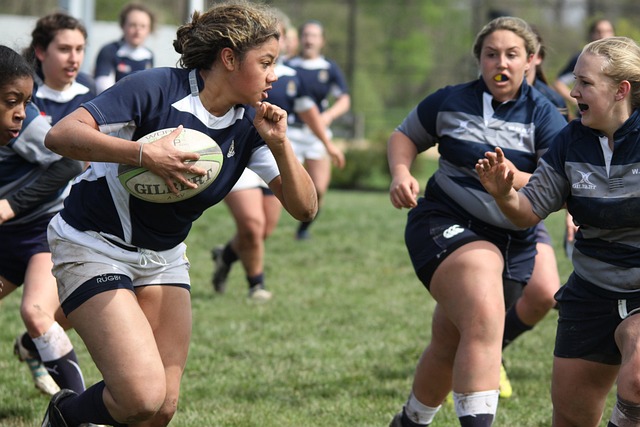
The majority of South Africans are African-Americans, with almost ninety percent being black. However, rugby is a game played by a majority whites. The number of black rugby players has risen dramatically over the past few years and South Africa's national team has been a strong force on the international rugby stage.
South Africa's original rugby sport was the Cape colony. After being introduced to the region by the British colonists, the sport was adopted enthusiastically by young Boer farmers. It spread along gold and diamond routes, eventually creating rugby clubs in Natal and the interior. In Sea Point, which is now the Western Cape in South Africa, the Hamilton Rugby Football Club formed in 1875. It is South Africa’s oldest rugby club and still plays rugby today.

The South African Coloured rugby Board kept the game segregated, despite its popularity throughout the country. Black players were denied the opportunities that white players had. But they were awarded their own national honors. The apartheid period saw black rugby players denied many of the same opportunities that were available to them as those for white players. In the mid-1990s the legal apparatus that was apartheid had been abolished. Francois Piena and Nelson Mandela won the 1995 World Cup with the Springboks in 1995.
The Currie Cup is South Africa's premier domestic rugby union tournament. The tournament's inaugural edition took place in 1892. The trophy is still given to the top tier of champions. There are many other trophies that can be won in this competition. Five teams, four from South Africa and four from Central Cheetahs confirmed that they would take part in the 2006 competition. Now there are 18 teams participating in the competition with new additions from Japan and Argentina. The competition is expected to begin in mid-January.
The Springboks, South Africa’s national rugby side is one of most successful in the entire world. The current world champions are the Springboks. Since 2003, the team has been ranked seventh in the World Rugby rankings. The team has become a powerful force on the international rugby stage, and it remains one of the most popular sports in South Africa. However, South Africa still faces significant barriers to diversity when it comes to rugby.
The game was introduced in the Cape colony, where coloured and black populations adopted the sport. However, South Africa did not become a political entity until 1910. The Cape Colony ("South African") had played twenty matches by this time. They won one and drew one. The team conceded one point, and its first series at home was won.

In 1906, South Africa's first rugby team visited the British Isles. The Springboks defeated Britain in 1906, an historic feat. The Africa Gold Cups were canceled in 2005 due to lack of sponsorship. However, the 2007 Rugby World Cup was won in Johannesburg by the Springboks. This was a turning point for South Africa's rugby teams and also marked a new age for South Africa.
FAQ
Is extreme sport dangerous?
Extreme sports can be dangerous as they pose a risk of injury or death. There have been numerous deaths from other causes like drownings, car accidents, electrocution, and drowning.
Even when you're doing something relatively safe like riding a motorcycle or rollerblading there are still injuries.
Injuries are so likely that some people choose not to do extreme sports.
Due to the high risks involved in these extreme sports, the National Football League prohibits its members from participating.
Extreme sports are dangerous.
How is an extreme sport different from other sports?
Extreme sport is a combination of physical exertion, skill, and a challenge.
This may include the use of equipment like helmets, goggles or other unique clothing.
Extreme sports do not require any training, unlike traditional sports.
They are generally outdoors and have no protection in case something goes wrong.
Some extreme sports are illegal and others are legal. It all depends on where you live, and the type of activity that you are involved in.
Check the local laws before undertaking extreme sports.
What happens when someone is doing extreme sports and falls from a cliff?
Participating in extreme sports could cause you to fall off a cliff and break bones, or even your neck.
This injury could be fatal. Falling from a height above 30 meters (100 feet) could result in your death.
Is extreme sport expensive equipment?
Yes. Extreme sports equipment costs thousands of dollars. But people who participate in these activities don't need much money.
Should kids do extreme sports?
The answer depends on whether you discuss sports as a whole or individual sporting activity. They should attempt all sports activities. But, if you're talking about specific sports (i.e. skiing), it will depend on what type of skiing they are interested in. Some people like extreme sports, such as bungee-jumping, while others prefer the more gentle downhill skiing. It all depends on the level of risk involved. One example is that someone who enjoys bungee jumping might not like skydiving due to fear of heights.
From where do extreme sports originate?
Parachuting is the origin of extreme sports. Parachuting was created during World War II. The 1942 parachute jump was the first.
Parachutists jumped from airplanes and gliders. They flew low to the ground at high speeds. Then they opened their parachutes.
Parachute jumps could be deadly. These parachutists also died. Paragliding gained popularity after the war.
1948 saw the first paraglider pilot fly near Lake Garda. Paragliding has grown in popularity since then. Every year, paragliding attracts thousands of people.
Para-gliding is different from parachuting in a crucial way. Para-gliders instead of landing on the ground, land on water.
Statistics
- Overall participation has grown by more than 60% since 1998 - from 5.9 million in 1998 to 9.6 million in 2004 Artificial Wall Climbing. (momsteam.com)
- Based on the degree of difficulty, the routine is scored on form and technique (50 percent), takeoff and height (20 percent), and landing (30 percent). (britannica.com)
- Landscaping and grounds-keeping— according to government labor statistics, about 18 out of 100,000 workers in the landscaping industry are killed on the job each year. (rosenfeldinjurylawyers.com)
- Nearly 30% of all boardsailors live in the South, and more than 55% of all boardsailors live in cities with a population of more than two million people (momsteam.com)
- Nearly 98% of all "frequent" roller hockey participants (those who play 25+ days/year) are male. (momsteam.com)
External Links
How To
How can you master parkour skills?
Parkour is a running technique that allows people to run over obstacles like walls, buildings, fences and trees. It is one of the most well-known sports, with millions of participants all over the globe. Parkour comes in many forms, including freestyle and wall climbing, as well as urban exploration, rescue, escape, urban combat and other.
Any activity that improves your overall health and physical fitness is called fitness. This could include going to the gym, exercising cardio, or simply walking. Parkour is considered a sport since it requires athletes to use their body strength, speed, balance, coordination, and agility.
These are some tips to help beginners get started in parkour training:
-
You should choose a spot that doesn't have stairs or places that could inflict injury. Flat ground is best, so avoid hills. However, if you have the ability to climb up a tree then do so.
-
Wear proper footwear, like shoes made from rubber or leather. If you're not sure what shoe will work best for your feet, feel free to try them all. The right shoes are crucial for a successful parkour session.
-
Keep hydrated during practice sessions by bringing water bottles and snacks.
-
Before starting a parkour session, warm up first. This is warming up your muscles before you start the parkour session. Start slow and build intensity slowly until your muscles feel fully warmed up.
-
When jumping, don't rely on your legs or arms too much. Instead, you should focus on your core and back muscles to jump over obstacles.
-
Do not push yourself too hard. Instead, take breaks from time to time. This will allow your body to recuperate from the exercise without getting hurt.
-
Parkour can be enjoyed while you listen to music. Music can help you relax and focus better.
-
Stretch your muscles to prevent any injuries after each session.
-
Do not forget to clean up after your self, especially if you are doing so in public. You will not endanger someone else.
-
Keep track of how you are doing by writing down your results in a journal. This will help you to always recall your strengths and weaknesses.
-
Parkour is fun! Take it all in and enjoy the experience. If you fall, pick yourself up and move on.
-
Every day, learn new tricks.
-
Eat healthy food. A diet high in protein will help you gain muscle mass faster.
-
You should find a mentor. Mentors usually teach you how to make certain moves, and they also advise you about improving your skills.
-
Do not be afraid to ask for clarifications. It's a joy to help fellow enthusiasts learn new things. Ask!
-
Practice makes perfect. You can train whenever you want.
-
Have fun
-
And last but not least, stay safe!